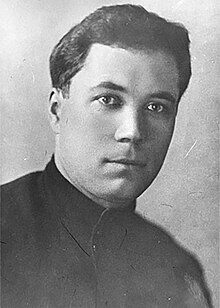
Back Aleksandr Beloborodov Azerbaijani Alexander Georgijewitsch Beloborodow German Alexandre Beloborodov French Alexander Beloborodov ID Aleksander Beloborodov Dutch Aleksandr Biełoborodow Polish Белобородов, Александр Георгиевич Russian Бєлобородов Олександр Георгійович Ukrainian 亚历山大·别洛博罗多夫 Chinese
This article needs additional citations for verification. (December 2017) |
Alexander Beloborodov | |
|---|---|
Александр Белобородов | |
 Beloborodov in 1937 | |
| People's Commissar for Internal Affairs | |
| In office 30 August 1923 – 3 December 1927 | |
| Preceded by | Felix Dzerzhinsky |
| Succeeded by | Vladimir Tolmachyov |
| Full member of the 8th Orgburo | |
| In office 25 March 1919 – 11 October 1919 | |
| Candidate member of the 9th Orgburo | |
| In office 5 April 1920 – 16 March 1921 | |
| Personal details | |
| Born | 26 October 1891 Alexandrovsk, Solikamsky Uyezd, Perm Governorate, Russian Empire |
| Died | 10 February 1938 (aged 46) Kommunarka, Moscow, Russian SFSR, Soviet Union |
| Cause of death | Execution |
| Resting place | Kommunarka Cemetery |
| Nationality | Russian Soviet |
| Political party | RSDLP (Bolsheviks) (1907–1918) Russian Communist Party (1918–1936) |
Alexander Georgiyevich Beloborodov (Russian: Алекса́ндр Гео́ргиевич Белоборо́дов; 26 October 1891 – 10 February 1938) was a Russian Bolshevik revolutionary, Soviet politician, party figure and statesman best known for his role as one of the chief regicides of Nicholas II and his family.
Born in Alexandrovsk, in the Solikamsky Uyezd of the Perm Governorate of the Russian Empire, he joined the Russian Social Democratic Labour Party in 1907. Siding with Vladimir Lenin's Bolsheviks, after the February Revolution, he became a member of the Ural Regional Party Committee, represented the Ural Bolsheviks at the Party Conference in April 1917, and subsequently became Chairman of the Central Executive Committee of the Ural Regional Council of Workers', Peasants', and Soldiers' Deputies, more commonly known as the Ural Soviet (Uraloblsovet). In July 1918, in coordination with Yakov Sverdlov in Moscow, Beloborodov ordered the execution of the former Tsar Nicholas II and his family, signing the decision by the Ural Soviet which was taken by Filipp Goloshchekin, after a final consultation with party leadership in Moscow, to deliver to Yakov Yurovsky with the final orders to murder the Imperial Family.
In March 1919 he was elected a full member of the Orgburo of the 8th Central Committee of the Russian Communist Party, and subsequently became a candidate member of the 9th Central Committee in April 1920. After the death of Yakov Sverdlov, he was considered a candidate for the post of Chairman of the All-Russian Central Executive Committee, the head of state of the Russian SFSR, but lost to Mikhail Kalinin. He subsequently served as the fourth People's Commissar for Internal Affairs of the Russian SFSR and the second for the Soviet Union, succeeding Felix Dzerzhinsky. A member of the Left Opposition associated with Leon Trotsky, he signed the Declaration of 46 in October 1923, making himself a lifelong enemy of future Soviet Leader Joseph Stalin. Like most Old Bolsheviks, especially those close to Trotsky, Beloborodov fell afoul of the Great Purge and was arrested in 1936. He was executed on 10 February 1938. Two decades after his death, he was posthumously rehabilitated in 1958.